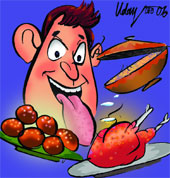 |
KnowHow Team explains: When we think about any delicious food, our mouth waters because of a neurological reaction: the reflex action.
A Russian scientist, Anton Pavlov first reported this, in the nineteenth century. He divided reflex action into two classes — conditional and unconditional reflexes.
The reflex actions that we inherit are commonly known as the unconditional reflexes, while those that we acquire from our day-to-day experience are called habitual reflex action like walking.
Watering of mouth falls under the first category.
As soon as we think of some delicious food, the thought process switches on a band of neurotransmitters (chemicals that transmit impulses to the brain). The brain identifies the signal and sends responses through carrier nerves to stimulate the saliva-secreting glands. This stimulation leads to the saliva secretion.
The sympathetic nervous system and allied neurotransmitters, like adrenaline and noradrenaline, control salivation.
But how does salivation help us? Salivary glands secrete saliva at the sight, thought or smell of food because they have an enzyme called amylase that digests starch into simpler carbohydrates.
The question was sent by Abhishek Aiyer, Calcutta










